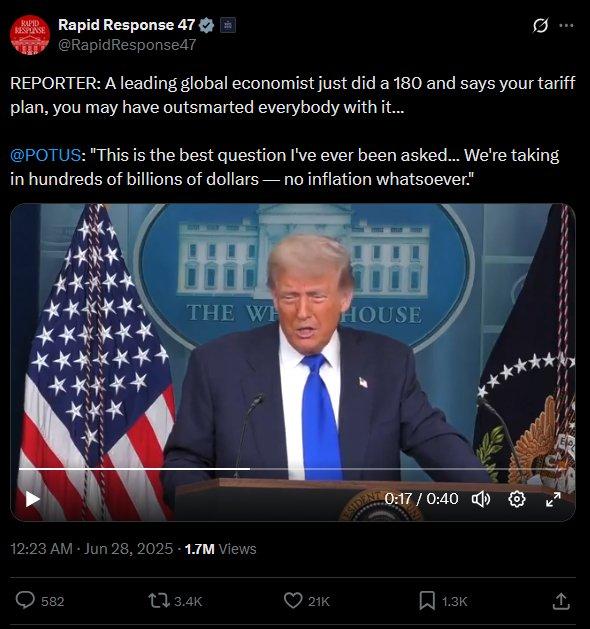
[Observer Network, Shao Yun]
“Could Trump really have ‘outsmarted’ everyone on tariffs?” As the deadline for July 9th’s tariff negotiation set by the US approaches, a Wall Street economist who had previously fiercely criticized the tariff policy suddenly reversed his stance, suggesting that perhaps the US government’s tariff strategy is more “smart” than imagined by the outside world, thrilling both President Trump’s supporters and himself.
This view comes from Torsten Sløk, Chief Economist at Apollo Global Management, who wrote a brief article on the company’s website last week. He stated that although the uncertainty brought about by tariffs has begun to pressure the US economy, Trump could control market panic by maintaining tariffs at an “acceptable level” and extending the negotiation period.
According to Sløk’s speculation, the Trump administration’s strategy might be to maintain a so-called “baseline tariff” of 10% on trade partners and give countries one year to negotiate with the White House to reduce non-tariff barriers. In his view, this would immediately decrease the uncertainty caused by tariffs, allowing American domestic businesses time to adapt to this “permanently high tariff” new world.
“This seems like a result beneficial to the global community, but it also provides $400 billion in annual revenue for American taxpayers,” Sløk claimed. “Trade partners will be satisfied with only 10% tariffs, while the US tax burden will rise. Perhaps this administration has truly outsmarted us all.”
The pro-Trump New York Post noticed Sløk’s article on the 27th and expressed delight, stating that this “positive view” contrasts sharply with Sløk’s previous stance.
It is reported that in April this year, Slocke warned that Trump’s tariff policies could trigger an economic recession in the summer, particularly harming small businesses in the United States and potentially disrupting the flow of goods from China to the United States, leading to layoffs and a broader economic slowdown.
During a press conference on the same day, questions were quickly raised about Slocke’s article towards Trump. Trump, who has been severely criticized by both conservative and progressive factions for his tariff policies, responded by saying it was the “best question” he had ever been asked.
“I like this question, I really like it. It’s my favorite. This is the best question I’ve ever been asked because for years I’ve been getting abused over this issue,” Trump said. When asked about his views on those critics who believe tariffs could lead to an economic downturn, Trump replied, “I think they should go back to business school.” He emphasized that tariffs would bring in “hundreds of billions of dollars” in revenue for the United States.
However, experts pointed out that Slocke and Trump’s view overlooked a significant fact: the so-called $400 billion in tax revenue seems substantial, but this “extra income” essentially comes from import taxes paid by American companies, which ultimately have to be borne by consumers. Even if companies absorb some of these costs, they balance this through wage cuts or layoffs.
Neil Saunders, a retail expert at British data analysis and consultancy firm GlobalData, warned that the impact of tariffs would largely be passed on to American consumers. “Regardless of the level of tariffs, they increase operating costs. If tariffs remain at their current level, price increases should be relatively moderate—although these price hikes will be compounded on top of the significant inflation experienced in recent years.”
“The Daily Mail in the UK, on the 29th, quoted an independent analyst stating that tariffs could increase spending for American families, including the prices of daily consumer goods such as groceries.
Moreover, unilaterally imposing discriminatory tariffs is a clear violation of the fundamental principle of most-favored-nation treatment under the World Trade Organization, representing a typical example of unilateralism, protectionism, and bullying, which will harm America’s global reputation. Sanders stated that considering Trump’s repeated threats to his trade partners, there remains uncertainty about whether Trump will change his mind and impose ultra-high tariffs. “Unless this person is Trump, then anyone claiming to know the direction of tariffs is not being honest.”